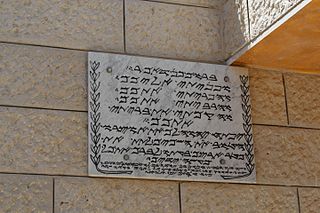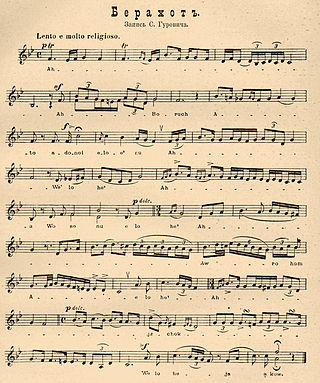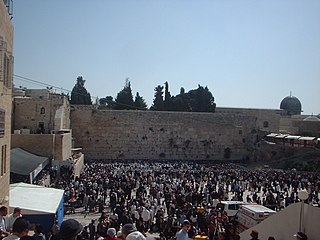Related Research Articles

Judaism is an Abrahamic, monotheistic, and ethnic religion. It comprises the collective spiritual, cultural, and legal traditions of the Jewish people, having originated as an organized religion in the Middle East during the Bronze Age. Contemporary Judaism evolved from Yahwism, the cultic religious movement of ancient Israel and Judah, around the 6th/5th century BCE, and is thus considered to be one of the oldest monotheistic religions. Religious Jews regard Judaism as their means of observing the Mosaic covenant, which was established between God and the Israelites, their ancestors. Along with Samaritanism, to which it is closely related, Judaism is one of the two oldest Abrahamic religions.

Samaritanism is an Abrahamic, monotheistic, and ethnic religion. It comprises the collective spiritual, cultural, and legal traditions of the Samaritan people, who originate from the Hebrews and Israelites and began to emerge as a relatively distinct group after the Kingdom of Israel was conquered by the Neo-Assyrian Empire during the Iron Age. Central to the faith is the Samaritan Pentateuch, which Samaritans believe is the original and unchanged version of the Torah.

A siddur is a Jewish prayer book containing a set order of daily prayers. The word siddur comes from the Hebrew root ס־ד־ר, meaning 'order.'

The Torah is the compilation of the first five books of the Hebrew Bible, namely the books of Genesis, Exodus, Leviticus, Numbers and Deuteronomy. The Torah is known as the Pentateuch or the Five Books of Moses by Christians. It is also known as the Written Torah in Rabbinical Jewish tradition. If meant for liturgic purposes, it takes the form of a Torah scroll. If in bound book form, it is called Chumash, and is usually printed with the rabbinic commentaries.

Yom Kippur is the holiest day of the year in Judaism and Samaritanism. It occurs annually on the 10th of Tishrei, corresponding to a date in late September or early October.
"God Bless America" is an American patriotic song written by Irving Berlin of Belarusian origin during World War I in 1918 and revised by him in the run up to World War II in 1938. The later version was notably recorded by Kate Smith, becoming her signature song.
Kol Nidre is a Hebrew and Aramaic declaration which is recited in the synagogue before the beginning of the evening service on the night of Yom Kippur. Strictly speaking, it is not a prayer, even though it is commonly spoken of as if it were a prayer. This declaration and its ceremonial accompaniment have been charged with emotional undertones since the medieval period, creating a dramatic introduction to Yom Kippur on what is often dubbed "Kol Nidrei night", with the entire Yom Kippur evening service popularly called Kol Nidrei.

Hatikvah is the national anthem of the State of Israel. Part of 19th-century Jewish poetry, the theme of the Romantic composition reflects the 2,000-year-old desire of the Jewish people to return to the Land of Israel in order to reclaim it as a free and sovereign nation-state. The piece's lyrics are adapted from a work by Naftali Herz Imber, a Jewish poet from Złoczów, Austrian Galicia. Imber wrote the first version of the poem in 1877, when he was hosted by a Jewish scholar in Iași.

The Amidah, also called the Shemoneh Esreh, is the central prayer of the Jewish liturgy. Observant Jews recite the Amidah at each of three daily prayer services in a typical weekday: morning (Shacharit), afternoon (Mincha), and evening (Ma'ariv). On Shabbat, Rosh Chodesh, and Jewish festivals, a fourth Amidah (Mussaf) is recited after the morning Torah reading, and once per year, a fifth Amidah (Ne'ilah) is recited, around sunset, on Yom Kippur. Due to the importance of the Amidah, in rabbinic literature, it is simply called "hatefila". According to legend, the prayer was composed by the rabbis of the Anshei Knesset HaGedolah. Accordingly, in Judaism, to recite the Amidah is a mitzvah de-rabbanan, i. e., a commandment of rabbinic origin.

Simchat Torah, also spelled Simhat Torah, is a Jewish holiday that celebrates and marks the conclusion of the annual cycle of public Torah readings, and the beginning of a new cycle. Simchat Torah is a component of the Biblical Jewish holiday of Shemini Atzeret, which follows immediately after the festival of Sukkot in the month of Tishrei.
Ahava rabbah is the name given in Ashkenazi Jewish custom to the blessing recited immediately before the Shema as part of the Shacharit (morning) prayer. The name is taken from the first words of the prayer.
Hallel is a Jewish prayer, a verbatim recitation from Psalms 113–118 which is recited by observant Jews on Jewish holidays as an act of praise and thanksgiving.
Lekha Dodi is a Hebrew-language Jewish liturgical song recited Friday at dusk, usually at sundown, in synagogue to welcome the Sabbath prior to the evening services. It is part of Kabbalat Shabbat.

Birkat Hamazon, known in English as the Grace After Meals, is a set of Hebrew blessings that Jewish law prescribes following a meal that includes at least a kezayit (olive-sized) piece of bread. It is understood as a mitzvah based on Deuteronomy 8:10.

The Priestly Blessing or priestly benediction, also known in rabbinic literature as raising of the hands, rising to the platform, dukhenen, or duchening, is a Hebrew prayer recited by Kohanim. The text of the blessing is found in Numbers 6:23–27.

Berakhot is the first tractate of Seder Zeraim of the Mishnah and of the Talmud. The tractate discusses the rules of prayers, particularly the Shema and the Amidah, and blessings for various circumstances.
Barukh she'amar, is the opening blessing to pesukei dezimra.
Shai Held is President, Dean, and Chair in Jewish Thought at the Hadar institute, which he founded in 2006 with Rabbis Elie Kaunfer and Ethan Tucker.
Hadar is an educational institution on the Upper West Side of Manhattan. The institute offers various programs to support the development of traditional egalitarian Judaism. A major component of the institute is Yeshivat Hadar, which offers both summer and year-long fellowships for students to learn full-time in the yeshiva setting. Prominent rabbis associated with the Yeshiva include co-founders Rabbi Shai Held, Rabbi Elie Kaunfer, and Rabbi Ethan Tucker.

Dirshu is an Orthodox Jewish international organization whose goal is to strengthen and encourage Torah study. Founded in 1997, the organization produces study cycles, sponsors shiurim, furnishes and grades tests, and offers financial incentives to individuals and groups to learn and master Talmud, Halakha, and Mussar texts. It has also published new editions of traditional Jewish texts, and sponsored major gatherings to celebrate the completion of its study cycles. As of 2018, more than 150,000 people have participated in its programs, which have spread to 26 countries on five continents.
References
- 1 2 3 Kaunfer, Elie. "Acheinu: A Prayer for Freeing Captives". My Jewish Learning . 70 Faces Media . Retrieved 5 January 2024.
- 1 2 Golding, David Nachman (2023-11-07). "We're All Acheinu". Mishpacha . Retrieved 5 January 2024.
- 1 2 "Acheinu – A Modern Classic". The Jewish Press . 2023-11-30. Retrieved 5 January 2024.
- ↑ Dov, Yehuda (2024-01-04). "Soldiers Near Captives In Southern Gaza Sing Acheinu". VIN News . Retrieved 5 January 2024.